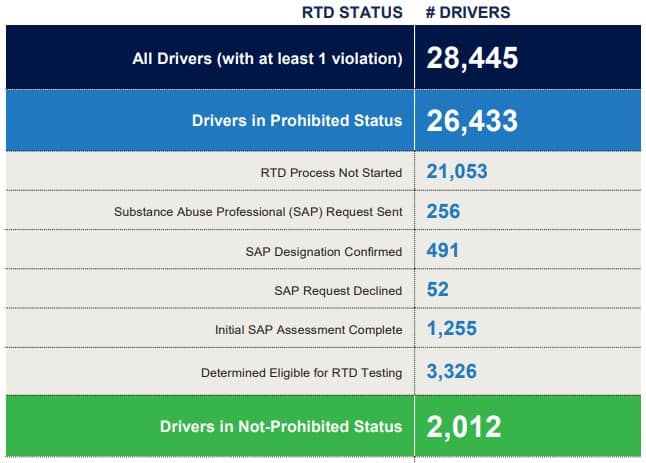An overwhelming number of drivers with drug and alcohol violations have failed to complete the federal return-to-duty process, a trend that could have trucking capacity implications down the road.
Statistics released this week by the Federal Motor Carrier Safety Administration (FMCSA) reveal that of the 28,445 drivers registering at least one drug or alcohol violation in the FMCSA’s Drug & Alcohol Clearinghouse, 26,443 – or 93% – are in “prohibited status” because they have not completed the steps required by the FMCSA that allow them to get back behind the wheel. In fact, as of August 1, 80% of those in prohibited status have not yet even started the return-to-duty (RTD) process.
While the prohibited status rate has come down slightly over the last three months – from 95% in May and 94% in June – the number of drivers not returning to the workforce due to drug or alcohol violations is concerning, according to trucking regulations expert David Osiecki, President and CEO of Scopelitis Transportation Consulting.
“Most drivers are not getting through the return-to-duty process, so we’ve basically lost those drivers,” Osiecki told FreightWaves. “Having a violation doesn’t make you a bad person, but the question is, how many are addressing their problem and staying in the industry? This may not be good for the driver shortage, but the American public expects sober and safe truck drivers.”

According to federal regulations, if a driver has a drug and alcohol program violation recorded in the clearinghouse, that driver must be removed from safety-sensitive functions, including operating a commercial motor vehicle, until he or she has completed the RTD process, which includes evaluation, treatment and follow-up testing.
Osiecki pointed out that until the FMCSA’s clearinghouse began collecting this information, it had really been available publicly, particularly on a monthly basis. “Because of that we don’t really know what the norm is – 7% making it through the RTD process seems pretty low,” he said. “As the data is compiled it will tell us how many drivers the industry will lose each year due to substance abuse issues.”
Clearinghouse data has also revealed that over the last two months, roughly 13% of drivers are attempting to cheat the urinalysis test, a statistic that could renew calls for hair testing because it has been shown to find evidence of drug use in drivers who have passed urinalysis tests. Trucking companies warned at an FMCSA-sponsored safety panel that a five-year delay in a rulemaking on giving them the option to replace urinalysis with hair testing is preventing the industry from hiring safe drivers.
Executives have also emphasized that the clearinghouse, which may begin using hair test data from carriers that use those tests to screen their drivers, will end up keeping many drivers off the road that otherwise would have been hired, potentially leaving more trucks sitting empty.
But the clearinghouse has revealed positive trends with regard to the driver pool as well. Full, pre-employment database queries increased between May and June (by 28%) and again between June and July (by 13%). Because querying the database for driver violations is required when drivers begin the hiring process with a carrier, this data is considered an indication of new driver hiring.
Related articles:

Dawn Dregier
Speaking as an owner of a nationwide network of DOT qualified SAP’s , we have seen a major uptick in RTD inquiries, but a serious decline in driver enrollments , confirming these statistics.
Matt Colliver
I think the reason more driver don’t follow the RTD is the fact that most companies will not hire them with a failed drug or alcohol test. Either company policy or the companies insurance company says no.